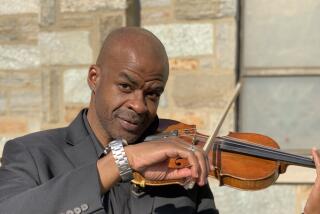‘TEEN-AGER’ FOSS TURNING 65
- Share via
“George Szell used to call me ‘the perpetual teen-ag” recalls Lukas Foss. “I always took that as a compliment. I can’t be less than enthusiastic where music is concerned. I fell in love with music as a child, and with a lot of specific pieces of music after that. This is a lifelong love affair. Somehow, I never learned to be cool about it.”
The veteran composer/conductor/pianist/raconteur has recently arrived from England, where six of his works, written over the decades, were played at the 1987 Aldeburgh Festival. Now he sits, relaxed but alert, gazing distractedly through a bank of uncurtained windows over a stunning landscape: the Santa Monica Mountains as seen from a rambling house just below their highest point in a secluded Brentwood neighborhood. This will be his home through mid-August.
“I never intended to be an educator, only a musician,” Foss says, explaining his residency here this summer. “But, somehow, I always end up in a position to teach.”
Through a career beginning with a post as pianist with the Boston Symphony (1944-50), through his years as music director of the Buffalo Symphony (1963-70) and later with the Milwaukee Symphony (1981-86), but especially in his tastemaker role as music director of the Brooklyn Philharmonic (1971 to the present), Foss, as program builder, champion of new music and stalker of historical esoterica, has served an educational function.
Along the way, too, Foss, with the aid of Ernest Fleischmann, executive director of the Los Angeles Philharmonic, invented the musical marathon, a one-composer or one-theme extended concert. He also imported the marathon to Brooklyn.
This summer he is a teacher again at the Los Angeles Philharmonic Institute (he conducts the Institute orchestra in Beethoven’s Ninth Symphony at Hollywood Bowl next Sunday, then returns as pianist on the concluding Institute concert Aug. 16). Foss, with Philharmonic Music Director Andre Previn, co-directs the institute. In that post, he returns to teaching at UCLA, the very campus he left, to seek wider horizons on the East Coast, 25 years ago this summer.
Commuting the few miles from his rented Brentwood aerie to the Westwood school--where he taught from 1953 to 1962--Foss says, “is like coming home, after all these years. This summer I’m really thinking a lot about the old days.”
There is another reason for retrospective thoughts: On Aug. 15 Foss turns 65.
Through the length of his public musical life, Foss has been accused of being scattered, of trying to do too many jobs. In the 1970s, one observer described Foss as “continually distracted from his composing by conducting and piano-playing.” The craggy-faced, still-apparently enthusiastic veteran musician denies that assertion.
“I don’t ever feel torn or distracted. You see, everything I do is music, and it’s all serious music. I hope there is wit and humor in all of it, of course, but it is all serious. I’ve never written a Broadway show, or wanted to do a musical, or aspired to films.
“And my various activities have usually fed off each other. My conducting gives moral support to my composing, and vice versa. Of course, when things go badly, just as when they go well, it all comes together.” For one moment, he is downbeat. Then: “But that’s life.”
The mood of reflection is further dispersed when Foss talks about his current projects--the institute, his upcoming Brooklyn season, the works he is writing or has recently completed.
He laments getting so far behind in fulfilling his commissions for new works, regretting that in one case, “I had to give the money back--I simply ran out of time.
“Time--that’s the thing I sometimes feel the lack of. Energy, interest, curiosity, I’ve got plenty of those. But the clock keeps running.”
With characteristic optimism--one critic calls Foss “American music’s most irrepressible spirit”--the composer dwells more on the upcoming deadlines-not-met than on those already passed. He mentions the symphony he is writing “For the BBC--that’s an important commission, and the nice thing is, there is no deadline attached to it.” But he continues to work toward completion of pieces with specific submission-dates.
He also names several works-in-progress--”All coming along, all coming along,” he says quickly, as if his questioner were about to nag him on the subject--but in particular “a piano piece for Leo Smit,” which he must finish by October. “I’m not working on it now, not while spending every day with the institute students. But when Andre (Previn) arrives (at the Institute) in August, I will have a little time to get to it.”
Also, a solo guitar piece; a work for violin and piano, to be given simultaneous premieres around the world by three prize-winning young duos; a large symphonic work for the 1988 centennial of the Milwaukee Symphony. . . .
To the casual observer, Foss’ life style--his insistence on maintaining constant activity as composer, podium personality and, against his stated intentions, pianist--might seem frenzied and fragmented. But Foss says he likes things as they are.
“I’m a very happy person,” he claims, without stridency, “One with absolutely no regrets.
“Look--in the 19th Century, it was accepted that a composer could also conduct,
certainly his own works, but often the works of others. And, if he also played the piano or violin, why not? As recently as Mahler, no one questioned the tradition of the performing composer. Now, some people consider it taboo. Unfashionable. Well, I’ve often been unfashionable. So be it.”
The extreme eclecticism of his compositional style has tended both to endear him to some listeners and to alienate him from some critics--but not irretrievably. One of his more recent pieces, “Tashi,” written for the ensemble of that name, and introduced around the country by Tashi in February and March, was praised highly for its charm, if not for its depth, despite its minimalist orientation.
“I certainly haven’t become a minimalist,” says Foss, smiling at the thought, “But, as with other movements and techniques--the word is technique and not style, you see--I try to see what it has that I can use. That’s what eclecticism is, and I subscribe to it unashamedly.”
He points out that, rather than follow trends, his method, over the decades, has been “to discover these things long after they had been abandoned by the trendy. Twelve-tone composition, for instance. I came to that not only long after Schoenberg was dead, but after many others had looked into it and retreated.”
He says the same thing about electronic composition: “I was always the last to arrive. But sometimes I found something.
“What some people don’t notice when they call me trendy is that I got there after the trend, and usually out of simple curiosity. Like Ives, who usually got there too early, I did nothing at the right time. I usually got there too late.”
Unlike some creative musicians who go back and repudiate their youthful works, Foss says some of his pieces from the 1940s and ‘50s are works he still likes (he has also withdrawn some works from his own catalogue).
“Some of those early works I really love. Looking back now, on pieces like ‘The Prairie’ (which I wrote when I was 19) or ‘The Song of Songs’ (1946), I can say--as Beethoven did--that what I did instinctively then, I have since had to learn the skills to do again.”
Retrospectives would seem to be out-of-character for the always forward-looking Foss, but he enjoyed his recent feting in England.
“Just before coming here, I was at the Aldeburgh Festival. They featured six of my works--including ‘Echoi’ (a chamber piece from 1963) and ‘Time Cycle,’ and I must say it was nice to hear them all in a short period of time.
“I conducted some, and played a four-hand (piano) piece with Murray Perahia. They made quite a fuss, and I was surprised I enjoyed it so much.”
And yet, for all the pleasantries of recognition, Foss says career is not one of his main interests.
“In the present world of music, it seems, you have to be a PR person. But the trouble is, one can’t make a contribution to art if one is preoccupied with career, because art and image are absolutely incompatible.”
Better to be a “worker in the fields,” he says.
“If I concentrated on polishing my image, I would have no time to make music--either to write or to prepare performances. That is what happens, young people work on the career, protect the image they are building, and never get the actual work of creating done.
“Then, when they begin to believe their own bull, they are suddenly discovered to have developed . . . charisma!” Lukas Foss laughs at his own joke. “I’m sorry, there is no time for that. Life is too short.”
More to Read
The biggest entertainment stories
Get our big stories about Hollywood, film, television, music, arts, culture and more right in your inbox as soon as they publish.
You may occasionally receive promotional content from the Los Angeles Times.










